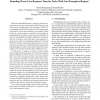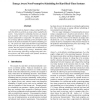93 search results - page 1 / 19 » Schedulability analysis of non-preemptive recurring real-tim... |
RTAS
2010
IEEE
13 years 9 months ago
2010
IEEE
While most prior work on multiprocessor real-time scheduling focuses on independent tasks, dependencies due to non-preemptive sections, suspensions, and pipelinebased precedence c...
RTCSA
2008
IEEE
14 years 5 months ago
2008
IEEE
Real-time systems are often designed using preemptive scheduling to guarantee the execution of high priority tasks. For multiple reasons there is a great interest in exploring non...
RTAS
2008
IEEE
14 years 5 months ago
2008
IEEE
Real-time schedulability theory requires a priori knowledge of the worst-case execution time (WCET) of every task in the system. Fundamental to the calculation of WCET is a schedu...
ECRTS
2005
IEEE
14 years 4 months ago
2005
IEEE
Low-level support of peripheral devices is one of the most demanding activities in a real-time operating system. In fact, the rapid development of new interface boards causes a tr...
ECRTS
2005
IEEE
14 years 4 months ago
2005
IEEE
Slowdown based on dynamic voltage scaling (DVS) provides the ability to perform an energy-delay tradeoff in the system. Non-preemptive scheduling becomes an integral part of syste...



